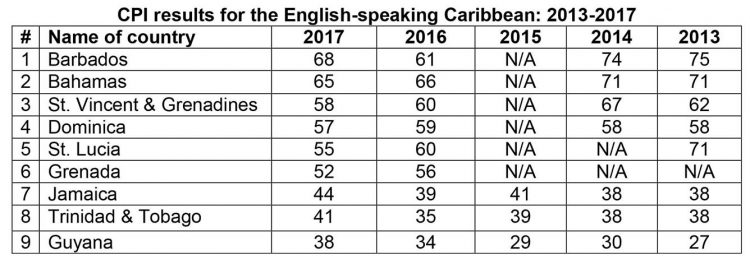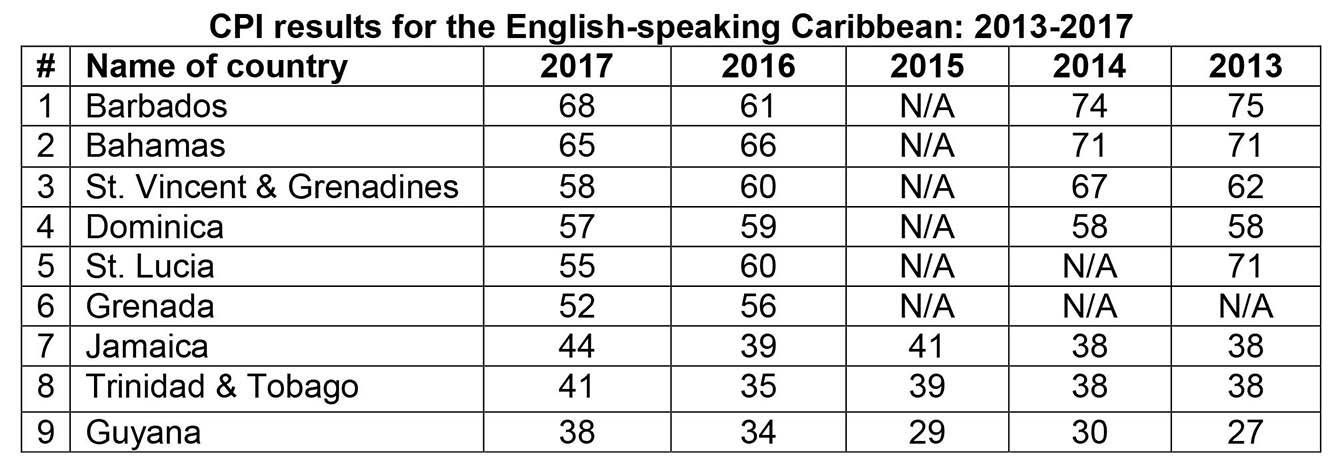Guyana has moved four points up on the Corruption Perceptions Index (CPI) for 2017, from 34 to 38, with a ranking of 91 out of 180 countries surveyed. In 2016, it had recorded a five-point increase which was the third highest among all the countries surveyed. However, as shown in the table below, Guyana remains at the bottom of the table, compared with the other English-speaking Caribbean countries. Significantly more and sustained efforts therefore need to be made to reduce the extent to which corruption is perceived to exist in the Guyanese society.
 Three weeks ago, we began our examination of the key provisions of the Petroleum Agreement between ExxonMobil and the Government of Guyana. So far, we have completed five areas, namely: petroleum exploration and production licences; the issue of confidentiality; annual licence rental charge; cost recovery and profit sharing; and taxation and royalty. Our concerns highlighted in previous articles remain valid, especially in relation to the profit-sharing arrangements and the quantum of royalty payable to the Government. We considered that it would be more appropriate for a revenue-sharing arrangement to be in place rather that a profit-sharing one, to avoid the difficulties and pitfalls associated in verifying recoverable costs in terms of their reasonableness, validity and conformity with terms and conditions of the Agreement, among others. In this regard, we argued for a re-negotiation of the Agreement.
Three weeks ago, we began our examination of the key provisions of the Petroleum Agreement between ExxonMobil and the Government of Guyana. So far, we have completed five areas, namely: petroleum exploration and production licences; the issue of confidentiality; annual licence rental charge; cost recovery and profit sharing; and taxation and royalty. Our concerns highlighted in previous articles remain valid, especially in relation to the profit-sharing arrangements and the quantum of royalty payable to the Government. We considered that it would be more appropriate for a revenue-sharing arrangement to be in place rather that a profit-sharing one, to avoid the difficulties and pitfalls associated in verifying recoverable costs in terms of their reasonableness, validity and conformity with terms and conditions of the Agreement, among others. In this regard, we argued for a re-negotiation of the Agreement.
Guyana’s natural resources belong to its citizens and should be exploited so as to ensure that they obtain the maximum possible benefits from such resources. Upon careful examination of the Agreement, however, the reverse appears true. The Agreement is overwhelmingly weighted in favour of Exxon, raising serious doubts about our negotiators’ ability to agree on a deal that is fair for both parties, and one that represents the best interest of the country. While we acknowledge that one of the key objectives of a company is the maximisation of shareholders’ wealth, the pursuit of such objective needs to be tempered with a social conscience, especially when negotiating agreements with poor developing countries like ours with little or no bargaining power and an inexperienced team of negotiators.

